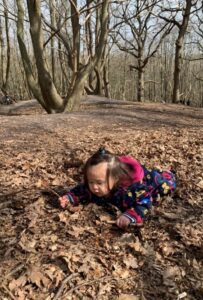By Dr Joanne Josephidou, Programme Lead, Early Childhood, The Open University

Recently, I had the opportunity to present at the BECERA conference along with my colleague Dr Nicola Kemp from Canterbury Christ Church University. We talked about some initial findings of a new project we have just started, funded by the Froebel Trust. In our presentation, we began by revisiting the findings of a previous research project which found that babies are particularly excluded from policy/practice/research about outdoor practices in ECEC settings (Kemp and Josephidou, 2021). This exclusion seems to arise from an understanding that the outdoors is a risky place and also a place to be physically active so that there is ‘a focus on mobile children and an underlying assumption that the outdoors is for older children and that babies will be inside’ (Josephidou and Kemp, 2022). We were interested to explore this idea of exclusion further so carried out a systematic review of the research literature which focuses on children aged birth to two and their experiences with nature and the outdoors. We still wanted to find out practices in settings but also what was happening in the wider community as well.
Socio-economic exclusion
An additional layer of exclusion that emerges when we look at babies’ and toddlers’ engagement both within and beyond the setting is that of ‘socio-economic status’. Sometimes this intersected with class and/or ethnicity as another means of exclusion. There are three key ideas emerging here:
- ‘Buying’ nature: access to nature experiences can depend on the families’ socio-economic status;
- Living in a healthy environment: families with low socio- economic status are impacted more by air pollution because their homes can often be situated near busy roads or factories;
- ‘Creeping exclusion’: this is when certain groups can slowly come to dominate and therefore marginalise others in green spaces.
We also found that the outdoors is a key space to pass on cultural practices such as sleeping outdoors or the human relationship with nature. However, within this idea was an additional layer of exclusion which sometimes intersected with socio-economic status, ethnicity and class.
Cultural exclusion
Three key ideas that emerged from this theme of cultural exclusion are:
- The ‘good parent’: ideas about what a ‘good’ parent is and does varies greatly from culture to culture;
- Trying to be a ‘good’ parent: there is a lot of pressure on parents to try and meet cultural expectations including in terms of outdoor engagement;
- The ‘other’ parent: parents can be excluded from outdoor spaces if their parenting is not approved of by others.
We are interested in the role of the ECEC setting in addressing these different layers of exclusion and so our new project will involve by working with parents and settings to develop an understanding of nature engagement from diverse cultural perspectives. We want to work collaboratively with the families and practitioners at five ECEC settings located in contexts of socio-economic deprivation and cultural diversity to help them ‘naturalise’ their outdoor areas. We hope this will enable us to create a multicultural, inclusive and democratic model of Nature Engaging & Nature Enhancing (NENE) pedagogy for babies and toddlers and answer our research question:
How can English ECEC settings in urban contexts be supported to develop democratic and inclusive NENE pedagogies for babies and toddlers?
